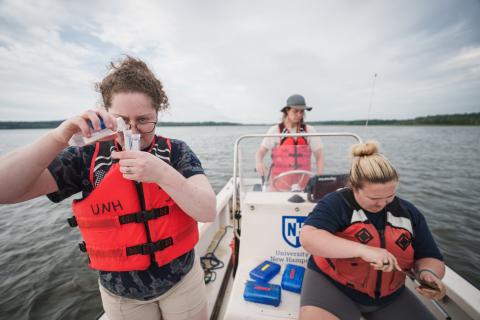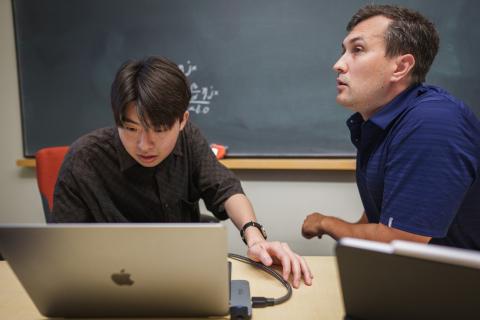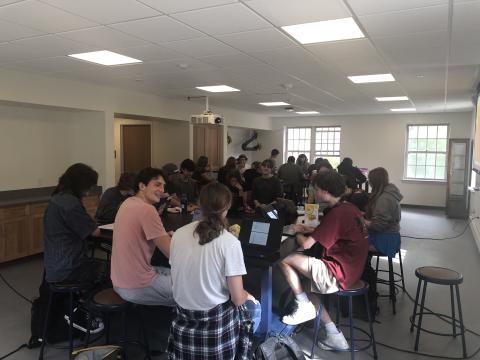UNH Parents Guide to the Value of Undergraduate Research
Imagine your student having NASA science experience listed on their resume by the time they graduate — quite impressive, especially to a prospective employer, right? But it’s not likely to happen while they’re sitting in a classroom; undergraduates who take the initiative to get involved with research of any type can reap both personal and professional benefits.
Our Parents Guide blog series is here to help you guide your student to make the right decisions throughout the college application and decision processes. Today, we're talking about how your student can get involved in undergraduate research and the benefits of starting research early.
So how does a student get involved in research projects while they’re an undergraduate? And what’s the value of that experience for them? Four UNH faculty members share their perspectives.

UNH undergraduate researchers examining eastern oysters in early larval stages in the Great Bay Estuary
Q: What practical steps can students take to get involved in research?
Scott Ollinger, Professor of Natural Resources and the Environment:
“The best step is to just talk to professors, especially those teaching a course you like. Send an email or just say hello at the end of a class. Tell them you’re interested in research and ask them to keep you in mind if they have a need for student help in their lab. Many students are too shy to do this, or they think they’ll need experience. And don’t be discouraged if nothing materializes right away.”
Alexandra Contosta, Research Assistant Professor in the Earth Systems Research Center:
“Students can also ask if professors know of any colleagues looking to hire. Sometimes I may not have a position available but may have a colleague needing undergrad help.”
R. Scott Smith, Professor of Classics:
"This is easy—go talk to faculty, as often as possible! Most have some research project they are working on and would, if nothing else, love to talk about it. The other step is to be intellectually curious! My own questions to students are: how are you going to change yourself, and how are you going to change the world? (by “world” I don’t mean global, but also in one’s local sphere)."
Jennifer Griffith, Associate Professor of Organizational Behavior:
"I would say the practical first step is for students to consider what topics they are interested in learning more about – what topics do they find themselves thinking and talking about? Once they have a basic idea of their own interests, it’s important to find someone who can both guide them through the process and has expertise in their areas of interest. Many faculty are actively involved in research and provide information about what they are working on or have worked on via UNH Scholars, their faculty pages or their own personal websites. When students find some faculty members that might be a good fit for them, reach out!"

UNH physics undergraduate research on nonlinear dynamics of skyrmion confined in one dimension
Q: What post-grad outcomes are available for those who conduct research as undergrads?
Scott Ollinger:
“Having experience working in a real lab is great to have on a resume. It also helps build confidence and exposes students to topics and career options they wouldn’t otherwise know about. As an example, most undergrads who get involved in research work alongside graduate students. This can help them understand what grad school options are out there and alleviate concerns about whether they have the ability to go further.”
Alexandra Contosta:
“Some students who work in a lab and do research get to attend conferences and present their findings. This can help build confidence and also provides networking opportunities with people at multiple career stages and sectors (not just academia).”
Jennifer Griffith:
"There is research going back decades that shows students who engage in undergrad research are more confident in their abilities (even beyond research skills) and have higher levels of self-efficacy (in other words, they believe they can do what they need to in order to succeed). Both of those characteristics are associated with positive career AND life outcomes. That aside, as technology continues to advance rapidly, employers across industries continue to report that they need employees with excellent critical thinking and analytics skills – those are core skills gained through the research process."

R. Scott Smith's Greek Myth Lab
Q: What personal and academic skills do undergrad students develop because of their involvement in research?
Scott Ollinger:
“The most useful personal skills are gaining confidence and simply maturing in a way that isn’t possible from working in classrooms alongside other students. Science can seem mysterious and impossibly difficult to those who don’t have first-hand exposure to it. Students who see how it’s done and get to work alongside people who used to feel equally intimidated often realize it’s not beyond their grasp.”
Alexandra Contosta:
“Science can also seem so neat and tidy when students only read about it in textbooks or do labs with predetermined outcomes. The reality is that research is much messier and often includes a lot of false starts and dead ends on the road to testing a hypothesis. Undergrads working alongside grad students, postdocs and Principal Investigators get a front row seat to both the successes and failures that happen in science, which can give them a fuller view of how science really operates.”
R. Scott Smith:
"In my Greek Myth Lab, students have to work in groups to come up with accurate ways to capture data to feed into our database. Cooperation and thoughtfulness are central. Academically, they learn how to read difficult texts and interpret them correctly. Anyone who has to deal with a legal contract, business proposal or historical document will appreciate the practice in reading carefully!"
Jennifer Griffith:
"There are tons of benefits! In my own experience, I’ve watched students flourish once they realize, through research experience(s), they have the tools to answer the questions that are important to them. We all do research every day – what shoes to buy, what apartment to rent, what classes to take, what company to work for. Involvement in research means undergrads are more equipped to know how to ask meaningful questions and analyze sources of information that will help them find reliable answers and make the best choices for themselves."

UNH music student researching tunes and dances in the New England contra dance world
Q: Is there anything else parents should know about the value of undergrad research?
Alexandra Contosta:
“Students don't need to have prior work experience, either inside or outside of a lab, but prior employment can be a valuable asset. For example, I know that a student who has worked as a cashier or in food service has already proven themselves to be hard-working and detail-oriented, and these are skills that will serve them well in research.”
Jennifer Griffith:
"As a first-generation college student who had no idea what research was or how to do, I know it can be daunting to reach out to your professors when you feel like you know so little. But, for many faculty members, research is one of the most fun and rewarding parts of our jobs, and when students reach out about how to get involved, it’s a breath of fresh air. In short, don’t shy away from research opportunities – we all start somewhere!"
learn more about undergraduate research at UNH
related posts:
Parents Guide to the UNH Honors College
If you are the parent of a high-achieving student who wants to challenge themselves in college, this post is for you. Read on to learn more about the benefits of attending the Honors College at UNH and why it might be the right fit for your student. read more about the HOnors College